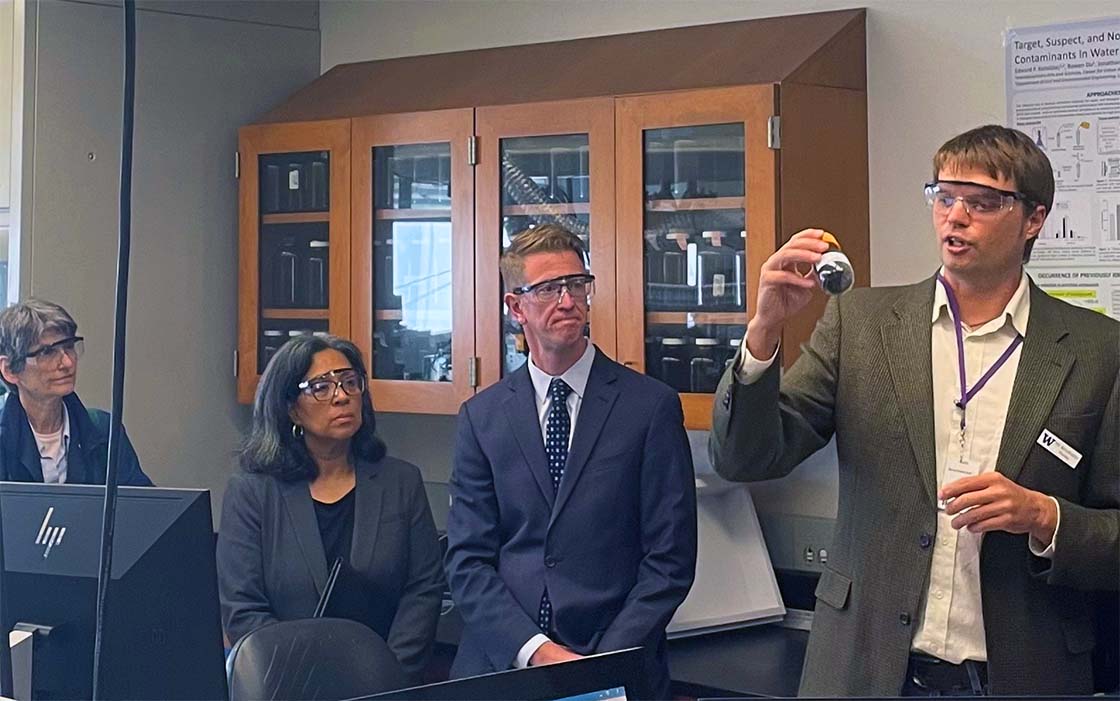
Ed Kolodziej Named a National Champion on Global Environmental Issues
UW Tacoma Professor Ed Kolodziej represented the U.S. for the prestigious Frontiers Planet Prize honoring “impactful research breakthroughs” in global sustainability science.
This Section's arrow_downward Theme Info Is:
- Background Image: ""
- Theme: "light-theme"
- Header Style: "purple_dominant"
- Card Height Setting: "consistent_row_height"
- Section Parallax: "0"
- Section Parallax Height: ""
UW Tacoma Professor Ed Kolodziej has been named a National Champion by the Frontiers Research Foundation, a non-profit organization based in Switzerland focusing on high-impact scientific solutions for global environmental issues. Finalists were chosen from a pool of 233 universities across six continents. Over 40 universities submitted candidates in the United States.
Kolodziej is a University of Washington professor with a joint appointment in UW Tacoma's School of Interdisciplinary Arts & Sciences/Science & Mathematics and Civil & Environmental Engineering on the Seattle campus. He is a principal investigator at UW Tacoma's Center for Urban Waters and the Puget Sound Institute.
Kolodziej traveled to Switzerland to receive the award. Natalie Eschenbaum, dean of UW Tacoma's School of Interdisciplinary Arts & Sciences traveled with him to the award ceremony. “We are so proud that Dr. Kolodziej was recognized as the U.S. champion and one of the world’s leading climate researchers,” said Eschenbaum. “Our hope is that this spotlight leads to environmental and policy changes that save the fish of our region and beyond.”
The honor recognizes Kolodziej and a multi-institution research team for their pioneering contribution to the discovery of 6PPD-quinone, a highly toxic derivative of automobile tires that is killing coho salmon and has emerged as a potential danger to other species including humans. Kolodziej led a team of researchers at UW Tacoma and Washington State University-Puyallup, among others, that discovered the previously unidentified compound which is now the focus of research around the world.
“I am honored to represent the United States and very proud that the excellent team of people working on this project, many of whom have dedicated years of sustained effort to this problem, got this recognition.” Kolodziej said.
The discovery reflects collaborators at NOAA-NMFS, the Washington State Department of Fish and Wildlife, the University of Toronto, and other organizations. Researchers have known since the 1980s that Puget Sound coho will often become sick when entering urbanized Puget Sound streams and more than half can sometimes die before spawning.
The discovery set off a shock wave in the tire industry and has led to calls to change the chemical ingredients of tires toward non-toxic compounds. 6PPD-quinone is now recognized as perhaps the second most lethal compound to sensitive aquatic organisms, Kolodziej said, and researchers have since found it in all types of environments throughout the world. The chemical can be dispersed through the dust and residue of tire wear particles that wash into waterways or dissipate into the air we breathe. It is also found in recycled tires used in crumb rubber play fields and other products.
“It’s not just out in the environment, but it’s in our bodies, too,” said Kolodziej. “This isn’t just an ecosystem problem. We’re also exposed or probably breathing it into our lungs as little bits of tire dust,” he said. Recent studies showed 60% to 100% detection frequency of 6PPD-quinone in human urine, although the potential effect of the chemical on human health is still unknown.
Kolodziej said he hopes the National Champion honor will raise awareness of the widespread pollution on roadways and the need to develop more environmentally friendly “salmon safe” automobile tires. “I see this as recognition that tire rubber is an unexpectedly large source of pollution. It shows that we need to change how our tires are made and how we are thinking about roadway runoff.”
Among other projects, Kolodziej said that the research team is now setting their sights on identifying chemicals that might be used in less toxic tires. “There’s a massive lack of data on all these industrial chemicals,” he said. “And those data gaps need to be filled to manage roadway pollution and develop tires that are safe for both people and fish.”
Research to manage and understand 6PPD-quinone and replace 6PPD with a non-toxic alternative will need more funding, he says, something that has remained a challenge despite the high-profile interest in the research teams’ discoveries.
Recent news
Main Content
Gathering Strength
News Tags on this arrow_upward Story:
- None
Main Content
UW Tacoma Enrollment up 4% for Autumn 2024
News Tags on this arrow_upward Story:
- None
Main Content
Celebrating First Gen
News Tags on this arrow_upward Story:
- None



